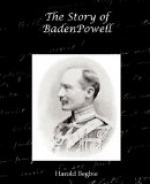I have in my possession a copy of Mr. Russell’s monograph on Mr. Gladstone, which had fallen into the hands of a grand old Tory parson. The margins of those pages bristle with the vehement annotations of my old friend. Against the statement that Mr. Gladstone had “a nature completely unspoilt by success and prominence and praise,” there is a vigorous “OH!” Where it is recorded how in 1874 Mr. Gladstone promised to repeal the income-tax, I find a pencil line and the contemptuous comment, “A bribe for power!” Mr. Forster’s resignation of office in 1882 is hailed with a joyful “Bravo, Forster!” and so on throughout Mr. Russell’s interesting book. But on the last page of all there are three pencil lines marking a sentence, and by the side of the lines the concession, “Yes—true.” The sentence is this: “But the noblest natures are those which are seen at their best in the close communion of the home.”
CHAPTER IV
CARTHUSIAN
A gentleman once wrote to the late headmaster of Charterhouse, Dr. William Haig-Brown, saying that he wished to have his son “interred” at that school. The headmaster wrote back immediately saying he would be glad to “undertake” the boy. The same headmaster being shown over a model farm remarked of the ornamental piggery, built after the manner of a Chinese Pagoda, that if there was Pagoda outside there was certainly pig odour inside.
Such a man as this is sure to have been impressed by the personality of Master Ste, who, in 1870, came to him in the old Charterhouse, that hoary, venerable pile which seems to shrink into itself, as if to shut out the unpoetic and modern atmosphere of Smithfield Meat Market. B.-P. went to Charterhouse as a gown boy, nominated by the Duke of Marlborough, and owing to the ease with which his infant studies had been conducted, was obliged to enter by a low form. But he had, as we have already said, an enquiring mind. He had also a clear brain, all the better for not having been crammed in childhood; and, therefore, strong in body, full of health and good spirits, and just as keen to get knowledge as to get a rare bird’s egg, he began his school-days with everything in his favour. The result was that 1874 found him in the sixth, and one of the brilliant boys of his time.
Dr. Haig-Brown, as we have said, was sure to have been impressed by B.-P., and there is no need for his assurance that he remembers the boy perfectly. Of course, when one sits in his medieval study and asks the Doctor to discourse of B.-P., he begins by recalling Ste’s love of fun; indeed, it is with no great willingness that he leaves that view of his pupil. But the boy’s inflexibility of purpose, his uprightness and his eagerness to learn are as equally impressed upon the headmaster’s mind, and he likes to talk about the exhilarating effect which B.-P.’s virile character had upon the moral tone of the school. “I never doubted his word,” Dr. Haig-Brown told me, and by the tone of the headmaster’s voice one realised that B.-P. was just one of those boys whose word it is impossible to doubt. A clean, self-respecting boy.




